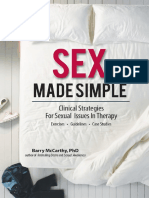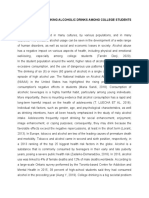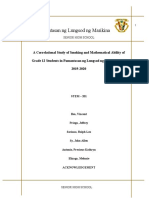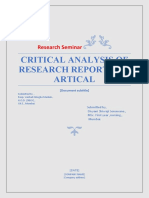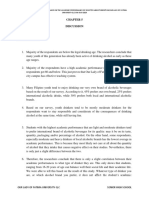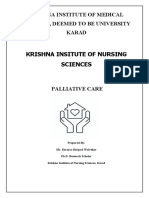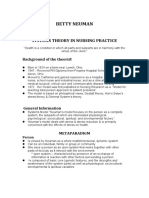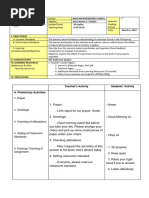100%(3)100% found this document useful (3 votes)
Problem Statement
Problem Statement
Uploaded by
Shreyas WalvekarThis document summarizes a study assessing the effectiveness of a video teaching module on nursing students' knowledge of the ill effects of alcoholism. The introduction provides background on alcoholism as a significant public health issue in India, noting that 15% of Indians who try alcohol become addicted, and India has over 63 million alcohol addicts. Chronic alcohol abuse promotes alcoholism and is associated with genetic and other risk factors. College students often view alcohol as exciting and cool based on advertising and social norms. The study aims to assess nursing students' knowledge of alcoholism's harms after a video module.
Copyright:
© All Rights Reserved
Available Formats
Download as DOCX, PDF, TXT or read online from Scribd
Download as docx, pdf, or txt
Problem Statement
Problem Statement
Uploaded by
Shreyas Walvekar100%(3)100% found this document useful (3 votes)
This document summarizes a study assessing the effectiveness of a video teaching module on nursing students' knowledge of the ill effects of alcoholism. The introduction provides background on alcoholism as a significant public health issue in India, noting that 15% of Indians who try alcohol become addicted, and India has over 63 million alcohol addicts. Chronic alcohol abuse promotes alcoholism and is associated with genetic and other risk factors. College students often view alcohol as exciting and cool based on advertising and social norms. The study aims to assess nursing students' knowledge of alcoholism's harms after a video module.
Original Description:
its important
Copyright
© © All Rights Reserved
Available Formats
DOCX, PDF, TXT or read online from Scribd
Share this document
Did you find this document useful?
Is this content inappropriate?
This document summarizes a study assessing the effectiveness of a video teaching module on nursing students' knowledge of the ill effects of alcoholism. The introduction provides background on alcoholism as a significant public health issue in India, noting that 15% of Indians who try alcohol become addicted, and India has over 63 million alcohol addicts. Chronic alcohol abuse promotes alcoholism and is associated with genetic and other risk factors. College students often view alcohol as exciting and cool based on advertising and social norms. The study aims to assess nursing students' knowledge of alcoholism's harms after a video module.
Copyright:
© All Rights Reserved
Available Formats
Download as DOCX, PDF, TXT or read online from Scribd
Download as docx, pdf, or txt
100%(3)100% found this document useful (3 votes)
Problem Statement
Problem Statement
Uploaded by
Shreyas WalvekarThis document summarizes a study assessing the effectiveness of a video teaching module on nursing students' knowledge of the ill effects of alcoholism. The introduction provides background on alcoholism as a significant public health issue in India, noting that 15% of Indians who try alcohol become addicted, and India has over 63 million alcohol addicts. Chronic alcohol abuse promotes alcoholism and is associated with genetic and other risk factors. College students often view alcohol as exciting and cool based on advertising and social norms. The study aims to assess nursing students' knowledge of alcoholism's harms after a video module.
Copyright:
© All Rights Reserved
Available Formats
Download as DOCX, PDF, TXT or read online from Scribd
Download as docx, pdf, or txt
You are on page 1/ 2
Problem statement:
A study to assess the effectiveness of video
assisted teaching module regarding ill-effects of
alcoholism on knowledge of BSc nursing
students at KINS karad.
Introduction(http://indianissue.com/alcoholismin-india/)
Alcoholism in India is a social and a public health issue. Excessive alcoholism causes disastrous
health issues and India is one of the countries having excessive alcoholism. Also, chronic alcoholism
is one of the greatest causes that has led to the poverty in India. It can be observed that most of the
people from rural areas and those belonging to the lower economic groups have this addiction of
taking alcohol which causes emergence of severe diseases among them. This may result in death
due to lack of good treatments in rural areas. Alcoholism in India is mainly linked with the family
circumstances and is a social taboo.1
In India, 15% of the individuals trying alcohol get addicted to it. Today India is having almost
63 million alcohol addicted people and the rate of Alcoholism in India has risen by 175% in the last
three years. Around 35-40% of Indian population has consumed alcohol in the year 2015. Amongst
them, 11% of the Indian population is indulged in heavy drinking. The per capita consumption of
alcohol in the year 2015-16 is around 2.5 liters which are a quite big figure. This shows that Indian
population is highly addicted towards alcoholism1
Alcohol consumption is worldwide health issue. Alcohol is underline cause of
3.8% of total deaths and 4.5% of total loss of DALY irrespective of societies and
occupation [1] . Alcohol consumption will lead to many negative health effects and
an array of harmful social consequences, impaired environmental relations and
family relations [2-4] . Alcohol remains one of the widely used drugs among college
students [5] . Chronic alcohol abuse, particularly associated with other risk factors
(including genetic predisposition) promotes the development of alcoholism a
disorder associated with the loss of control on the volumes of consumed alcohol[1]
Generally they spoke of alcohol as a fact of life and part of g r o w i n g u p . I
t i s glamorized and made to "look exciting" and "cool" in advertising and is
ubiquitous at soc ial events. More than half of the students around 56.7% expect
that alcohol Original Article Access this article online Quick Response Code
ATTITUDE OF COLLEGE STUDENTS TOWARDS ALCOHOL CONSUMPTION IN
MANGALORE 1 1 1 1 1 Deepak Daniel , Devishri Shetty , Greeshma Jilson Jose ,
Haritha J , Jeevan Ravi , 1 1 2 3 Lakshmi S Pillai , Anupa Neghandi , Santhosh &
Rashmi Kundapur 1 2 3 Students, Medico Social Worker, Associate Professor,
Department of Community Medicine, K. S Hegde Medical Academy, Nitte university,
Mangalore, Karnataka, India. Correspondence: Rashmi Kundapur, Department of
Community Medicine, K S Hegde Medical Academy, Nitte University, Mangalore 575 018, Karnataka, India. Mobile : +91 98804 96567 E-mail :
dr.rashmi.kundapur@gmail.com
Abstract : Introduction :
According to various studies conducted, the response of the adolescent
towards alcohol is different. Attitudes ranged from acceptance that is to "easy to
get" and is "just going to happen, "to personal responsibilities, it's your choice not
to drink peer pressure; you end up drinking to be part of group. Objectives : To
assess the attitude of youngsters towards alcohol consumption. Materials and
methods : A survey was performed in colleges under NITTE University. Students
present at the time of visit were covered. A questionnaire was prepared comprising
of a set of 14 questions covering the 3 main objectives of the survey. Results : As
per our survey of the 1150 students, 26.4% (304) students consume alcohol. Of
these who consume alcohol, 188 (61.84%) students felt it was safe to drink. Also a
majority of 219 students (72.03%) did not want to stop their drinking habits and 225
(74.01%) students haven't tried quitting. Surprisingly, a good 1050 (91.30%) out of
1150 students responded that they were aware of the harmful effects of alcohol
consumption. Conclusion : We have concluded that the students are well informed
and they know the ill effects of alcohol consumption even though, most of them
consider it as a part of life style.
54.5% think that they will be more open and friendly.46.7% think that they
will target problems if 1 they drink. Many youngsters gave 3 most common reasons
provided for why they started drinking were:- That friends did it and look like fun, A
desire to experiment and see what it was like, Following the examples of family
members and relatives Many youngsters consume alcohol on a trail and error basis.
Early teens and junior high were characterized as they have experimented on
drinking. They consume alcohol from friends and peer who would often buy alcohol
for them.
Keywords:Attitude, alcohol consumption, youngsters, harmful effects.
You might also like
- Care Certificate Learning Portfolio Editable50% (2)Care Certificate Learning Portfolio Editable31 pages
- Barry McCarthy Sex Made Simple - Clinical Strategies For Sexual Issues in Therapy PESI Publishing - M100% (3)Barry McCarthy Sex Made Simple - Clinical Strategies For Sexual Issues in Therapy PESI Publishing - M203 pages
- 1st Year Basic BSC Nursing Anatomy Word Notes in Details100% (1)1st Year Basic BSC Nursing Anatomy Word Notes in Details2 pages
- THE IMPACTS OF USING ALCOHOL AND CIGARETTES CONSUMPTION IN ACADEMIC PERFORMANCE OF THE HIGH SCHOOL STUDENTS IN Group 1 AristotleNo ratings yetTHE IMPACTS OF USING ALCOHOL AND CIGARETTES CONSUMPTION IN ACADEMIC PERFORMANCE OF THE HIGH SCHOOL STUDENTS IN Group 1 Aristotle15 pages
- Nursing Management of Patient With Disorders of Ent Third Yr100% (4)Nursing Management of Patient With Disorders of Ent Third Yr26 pages
- Mhn-Issues, Trends, Magnitude, Contemporary Practice HealthNo ratings yetMhn-Issues, Trends, Magnitude, Contemporary Practice Health15 pages
- Causes of Drinking Alcohol Perception of SHS StudentsNo ratings yetCauses of Drinking Alcohol Perception of SHS Students26 pages
- Student Attitudes Towards Drinking Behaviors100% (1)Student Attitudes Towards Drinking Behaviors27 pages
- The Effects of Drinking Alcoholic Drinks Among College StudentsNo ratings yetThe Effects of Drinking Alcoholic Drinks Among College Students7 pages
- THE EFFECTS OF ALCOHOL TO 1st YEAR EDUCATION STUDENTS OF LICEO DE CAGAYAN UNIVERSITY100% (2)THE EFFECTS OF ALCOHOL TO 1st YEAR EDUCATION STUDENTS OF LICEO DE CAGAYAN UNIVERSITY19 pages
- Exploring The Reason Behind Alcohol and Cigarette Consumption Among Teenagers in Laak National High SchoolNo ratings yetExploring The Reason Behind Alcohol and Cigarette Consumption Among Teenagers in Laak National High School8 pages
- Literature Review About Drug Abuse Among The YouthNo ratings yetLiterature Review About Drug Abuse Among The Youth9 pages
- Extent of Alcohol Intake Among Senior High School StudentsNo ratings yetExtent of Alcohol Intake Among Senior High School Students4 pages
- Presentation On National Mental Health PolicyNo ratings yetPresentation On National Mental Health Policy24 pages
- Effects of Alcohol Drinking in The Physical and Mental Health of The Selected Students of Grade-12 of Polillo National High School-Senior HighNo ratings yetEffects of Alcohol Drinking in The Physical and Mental Health of The Selected Students of Grade-12 of Polillo National High School-Senior High15 pages
- 'A Study To Assess The Effectiveness of Music Therapy On The Level of Depression Among Elderly in Volontariat Home, Oupalam, Puducherry''No ratings yet'A Study To Assess The Effectiveness of Music Therapy On The Level of Depression Among Elderly in Volontariat Home, Oupalam, Puducherry''3 pages
- The Effects of Alcohol On Juvenile Delinquency To The Study O1100% (1)The Effects of Alcohol On Juvenile Delinquency To The Study O18 pages
- Communication, Ipr, Group Dynamics and Organisational BehaviourNo ratings yetCommunication, Ipr, Group Dynamics and Organisational Behaviour30 pages
- Chapter 5: Current Trends and Issues in Guidance and CounselingNo ratings yetChapter 5: Current Trends and Issues in Guidance and Counseling5 pages
- The Psychological Effects of Vices Towards Academic Output Among Selected Senior High SchoolNo ratings yetThe Psychological Effects of Vices Towards Academic Output Among Selected Senior High School57 pages
- Critical Analysis of Research Report and ArticalNo ratings yetCritical Analysis of Research Report and Artical18 pages
- Substance Abuse Among The College Students Belonging To Naga Community in BangaloreNo ratings yetSubstance Abuse Among The College Students Belonging To Naga Community in Bangalore39 pages
- Drug Abuse Prevention, Treatment, and Rehabilitation100% (2)Drug Abuse Prevention, Treatment, and Rehabilitation16 pages
- RRL Mental Health Adjustment and Perceived Academic Performance of Senior Highschool Students100% (1)RRL Mental Health Adjustment and Perceived Academic Performance of Senior Highschool Students19 pages
- Legal and Ethical Issues in Psychiatric Nursing Fall 2021 - 2022No ratings yetLegal and Ethical Issues in Psychiatric Nursing Fall 2021 - 202244 pages
- Stress Levels Among The Senior High School Students in PracticalNo ratings yetStress Levels Among The Senior High School Students in Practical13 pages
- Senior Nursing Tutor, Associate Professor, Ved Nursing College, PanipatNo ratings yetSenior Nursing Tutor, Associate Professor, Ved Nursing College, Panipat5 pages
- Walwal Now, Aral Later: The Effect of Alcohol Consumption To Mechanical Engineering Students' Academic Performance50% (2)Walwal Now, Aral Later: The Effect of Alcohol Consumption To Mechanical Engineering Students' Academic Performance18 pages
- Review of Related Literature and StudiesNo ratings yetReview of Related Literature and Studies8 pages
- Substance Abuse and Substance Use Disorders. A Global Pandemic among Teenagers and Youths: Implications for CounselingFrom EverandSubstance Abuse and Substance Use Disorders. A Global Pandemic among Teenagers and Youths: Implications for CounselingNo ratings yet
- Possible Nursing Diagnosis According To Needs of Cancer Bedridden PatientNo ratings yetPossible Nursing Diagnosis According To Needs of Cancer Bedridden Patient2 pages
- Unit Iv Nursing Management of Patient With Gi Disorders100% (1)Unit Iv Nursing Management of Patient With Gi Disorders1 page
- GENITO URINARY SYSTEM 2nd Year BSC NursingNo ratings yetGENITO URINARY SYSTEM 2nd Year BSC Nursing8 pages
- Krishna Institute of Medical Science and Deemed To Be' University, Karad. Krishna Institute of Nursing SciencesNo ratings yetKrishna Institute of Medical Science and Deemed To Be' University, Karad. Krishna Institute of Nursing Sciences2 pages
- A Hybrid Deep CNN Model For Brain Tumor Image Multi-ClassificationNo ratings yetA Hybrid Deep CNN Model For Brain Tumor Image Multi-Classification21 pages
- Download Complete McGraw-Hill Education CCRN Review 1st Edition Michael Reid PDF for All ChaptersNo ratings yetDownload Complete McGraw-Hill Education CCRN Review 1st Edition Michael Reid PDF for All Chapters40 pages
- Department of Surgery Daily Census October 19, 2020: Dr. Maunting Dr. LucmanNo ratings yetDepartment of Surgery Daily Census October 19, 2020: Dr. Maunting Dr. Lucman11 pages
- How Much Have We Advanced?: English Pedagogical Module 2100% (2)How Much Have We Advanced?: English Pedagogical Module 232 pages
- NCPAcute Pain Related To The Effect of Gastric Acid Secretion On Damaged Tissue/gastric Ulceration.No ratings yetNCPAcute Pain Related To The Effect of Gastric Acid Secretion On Damaged Tissue/gastric Ulceration.6 pages
- Betty Neuman: Systems Theory in Nursing PracticeNo ratings yetBetty Neuman: Systems Theory in Nursing Practice4 pages
- Top 20 Topics For Inicet: Dr. Zainab Vora MBBS, MD Radiology (Aiims)No ratings yetTop 20 Topics For Inicet: Dr. Zainab Vora MBBS, MD Radiology (Aiims)26 pages
- DLL-SCIENCE-10 - Effects of Hormones in The BodyNo ratings yetDLL-SCIENCE-10 - Effects of Hormones in The Body7 pages
- Punjab Public Service Commission, Lahore: Muhammad Umair Zaigham HussainNo ratings yetPunjab Public Service Commission, Lahore: Muhammad Umair Zaigham Hussain2 pages
- Nursing Care Plan Cholecystectomy Gall Bladder Removal100% (16)Nursing Care Plan Cholecystectomy Gall Bladder Removal2 pages
- ISMS (Information Security Management System) Compliance UndertakingNo ratings yetISMS (Information Security Management System) Compliance Undertaking7 pages
- History/ Exam: Ending The Admission AssessmentNo ratings yetHistory/ Exam: Ending The Admission Assessment5 pages
- PDF The Collected Works of D W Winnicott Volume 3 1946 1951 1st Edition Donald Woods Winnicott Download100% (5)PDF The Collected Works of D W Winnicott Volume 3 1946 1951 1st Edition Donald Woods Winnicott Download84 pages

